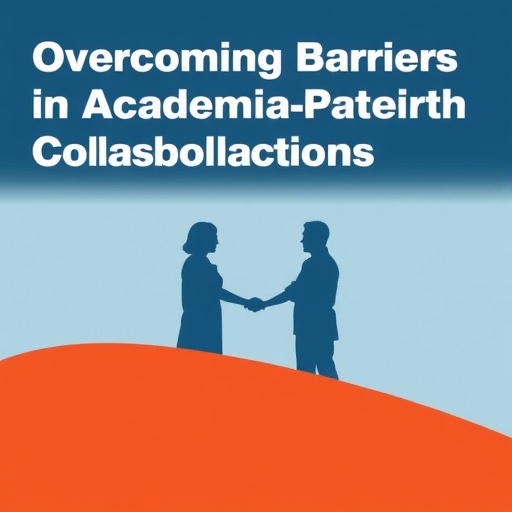In the intricate landscape of public health, the intersection of academia and practical application often teeters on a precipice, where the richness of scholarly research meets the pressing needs of society. Recent explorations into this dynamic have illuminated the myriad barriers and facilitators that influence research collaborations, a topic epitomized in the insightful study led by L. Arnold and colleagues. This qualitative interview study probes the complexities that shape partnerships between academic institutions and public health services in Germany, revealing profound implications for policy and practice.
Research collaborations between academia and public health entities are characterized by their potential to harness innovative solutions for pressing health issues. Yet, despite this potential, significant barriers persist. Arnold et al. embarked on a qualitative interview study that aimed to unravel the intricate factors that either obstruct or facilitate these collaborations. Their research is a pivotal step towards understanding how to bridge the often-conceived chasm between theoretical knowledge and its practical application in public health settings.
The crux of the study lies in its qualitative nature, offering rich insights through in-depth interviews with key stakeholders in both academia and public health sectors. This methodological approach allows for a nuanced understanding of the motivations, challenges, and needs of those actively engaged in research collaborations. The findings indicate that, while the desire for collaboration exists, systemic barriers can stifle progress and inhibit fruitful partnerships.
One major barrier identified in the study is the difference in priorities between academic researchers and public health professionals. Academics often operate within frameworks that prioritize publication and theoretical contributions, while public health practitioners are keenly focused on immediate community impacts and practical solutions. This disparity can lead to misalignment in project goals and expectations, ultimately jeopardizing potential collaborative efforts.
Moreover, the study highlights the bureaucratic hurdles that can impede collaborative efforts. Funding mechanisms, grant application processes, and institutional regulations frequently create a labyrinth of red tape that can deter both researchers and practitioners from embarking on joint ventures. Navigating these intricate pathways requires not only time and resources but also a shared understanding of the value of collaboration, which can be challenging to cultivate.
Another critical focus of Arnold et al.’s study is the significance of relational dynamics in fostering collaboration. Relationships built on trust, respect, and shared goals can significantly enhance the likelihood of successful partnerships. The qualitative interviews revealed that researchers who actively engaged with public health practitioners before the project initiation phase paved the way for smoother collaborations. This proactivity in relationship-building should be considered a fundamental aspect of any collaborative endeavor.
In addition to the barriers, the study uncovers various facilitators that can promote successful collaborations. One prominent facilitator identified is the increasing recognition of the importance of evidence-based practice in public health. As both sectors strive towards the common goal of improving health outcomes, the alignment of values and objectives can create fertile ground for collaboration.
The role of interdisciplinary training also emerged as a critical factor in enhancing collaboration. By equipping scholars and practitioners with the skills to communicate across disciplines, future collaborations can be better tailored to address complex health challenges. This educational approach not only fosters better understanding but also nurtures innovative thought processes that can lead to groundbreaking solutions.
In light of the findings, Arnold et al. advocate for the development of structured frameworks that can facilitate collaboration between academia and public health services. These frameworks could provide much-needed guidance on establishing partnerships, managing expectations, and navigating funding landscapes. Through such structures, the potential for collaboration can be maximized, ensuring that theoretical research informs practical applications effectively.
Additionally, the importance of policy advocacy cannot be overstated. As the study illustrates, driving systemic change requires empowering both sectors to advocate for conducive policies that support collaboration. Policymakers must recognize the value of these partnerships and work to create environments where they can thrive. This alignment of interests at the policy level is crucial for fostering a culture of collaboration.
As we reflect on the findings of this study, it is essential to consider the implications for the future of public health research and practice. The insights gleaned from Arnold et al.’s work serve as a vital resource for stakeholders aiming to enhance collaboration in the field. By addressing the identified barriers and strategically harnessing the facilitators, the potential to impact public health through innovative research collaborations becomes increasingly attainable.
In conclusion, the study spearheaded by Arnold and colleagues not only sheds light on the challenges of collaboration between academia and public health services in Germany but also underscores the critical importance of mutual understanding and shared objectives. As the landscape of public health continues to evolve, embracing the lessons from this research will be key to fostering effective partnerships that translate into tangible health improvements for communities.
The journey towards bridging theory and practice in public health is fraught with challenges, yet it is a journey worth undertaking. For researchers and practitioners alike, the call to action is clear: to embrace collaboration, to break down barriers, and to actively work together towards a healthier future.
Subject of Research: Barriers and facilitators of research collaborations between academia and public health services in Germany.
Article Title: Bridging theory and practice: a qualitative interview study of barriers to and facilitators of research collaborations between academia and public health services in Germany.
Article References:
Arnold, L., Vosseberg, F., Bimczok, S. et al. Bridging theory and practice: a qualitative interview study of barriers to and facilitators of research collaborations between academia and public health services in Germany. Health Res Policy Sys 23, 142 (2025). https://doi.org/10.1186/s12961-025-01413-w
Image Credits: AI Generated
DOI:
Keywords: Public Health, Academic Collaboration, Barriers, Facilitators, Qualitative Research, Germany, Evidence-Based Practice, Interdisciplinary Training.
Tags: academic-public health partnershipsbarriers to collaboration in researchbridging theory and practice in healthchallenges in academia-public health relationsenhancing research effectiveness in health sectorsfacilitators of research partnershipsGermany public health collaborationsinnovative solutions in public healthpractical applications of academic researchpublic health policy implicationsqualitative research in public healthstakeholder perspectives in public health research





